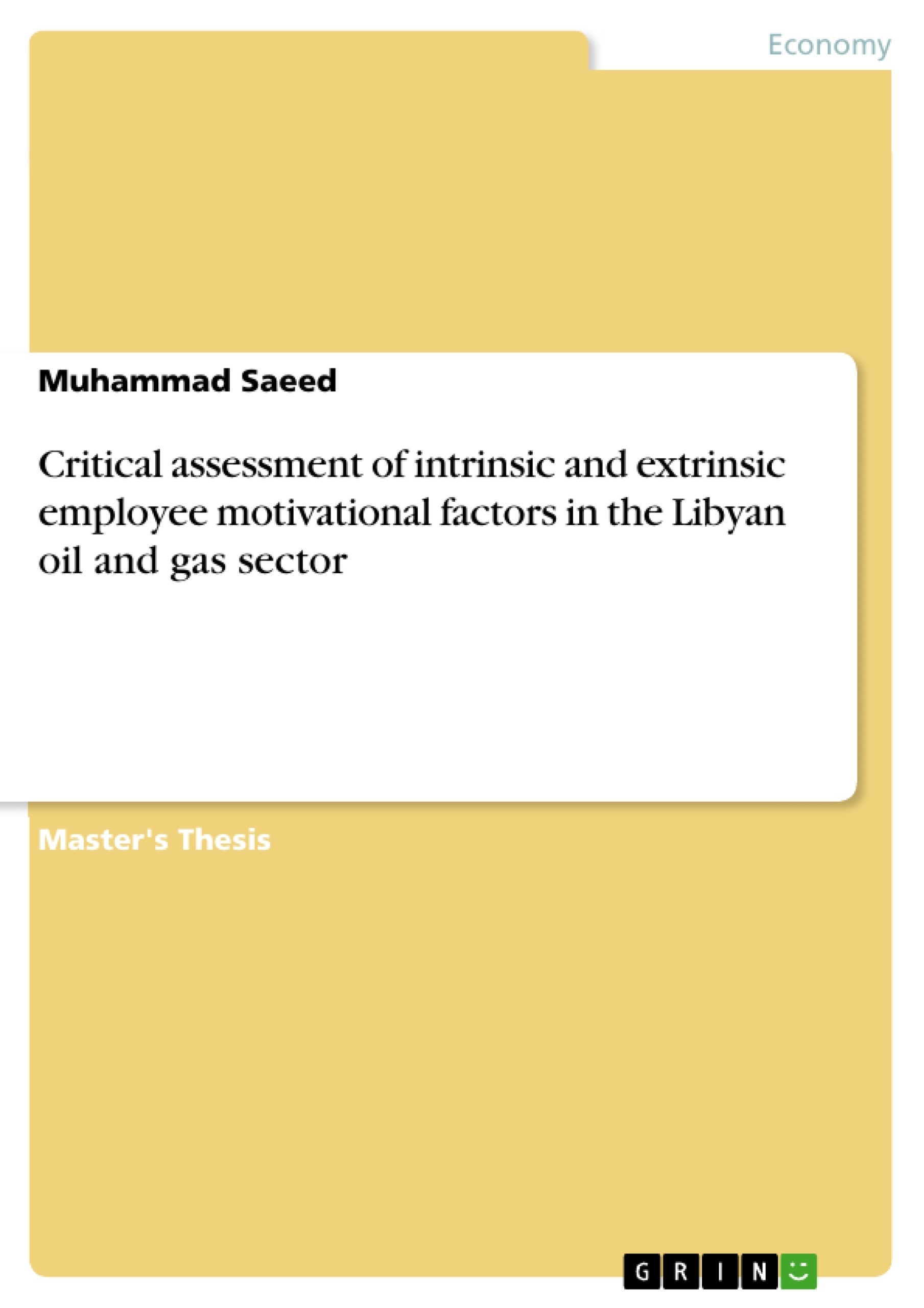This study was conducted to find aspects of motivation in the Libyan oil and gas sector. Mellitah was selected as the population of the study. Findings showed that a positive relation exists between extrinsic and intrinsic factors and employee motivation (with some exceptions). Also, the findings concluded that internal locus of control is also positively related to motivation of the employees. However, further research was recommended by the researcher to investigate other aspects of the concept.
Motivation is an interesting and researched topic and so is employee motivation. It has been found by various researchers that motivated employee perform better and help achieving the organisational goal. Therefore, motivating them ultimately benefits the company. Hence, it is important for organisations to know the intrinsic and extrinsic motivational factors and their effects on their employees. Companies should also know the link between employee motivation and their locus of control.
Inhaltsverzeichnis (Table of Contents)
- INTRODUCTION
- Background to the Research
- Research Aim and Objectives
- Justification of the study
- Outline of Chapters
- Definitions
- LITERATURE REVIEW
- Conceptual Framework
- Concept of motivation
- Intrinsic and extrinsic motivation
- Maslow's Hierarchy of Needs Theory
- Management application of Maslow's theory
- Motivational factors derived from Maslow's theory
- Herzberg theory
- Management application
- Motivational factors derived from Hertzberg Theory
- ERG Theory of Motivation
- Management application
- Motivational factors derived from ERG theory
- Goal setting theory
- Management application
- Motivational factors derived from Goal-setting theory
- Expectancy theory
- Management application
- Link between Locus of Control and Motivation
- Summary
- Methodology
- Research Design
- Research theory
- Sample
- Instrument
- Questionnaire structure
- Questionnaire design
- Testing and distribution
- Validity and reliability
- Data analysis
- Research ethics
- Summary
- Results and Discussion
- Introduction
- Data validity and reliability
- Demographics
- Ranking of motivational factors
- Motivation of employees in Mellitah
- Rewards
- Goal-setting
- Feedback
- Job features
- Salary
- Growth chances
- Working conditions
- Recognition
- Trainings
- Job responsibility
- Job security
- Performance evaluation
- Leadership
- Locus of Control
- Summary of findings
- Conclusions and Recommendations
- Introduction
- Conclusions
- Recommendations
- Future research
Zielsetzung und Themenschwerpunkte (Objectives and Key Themes)
This dissertation explores the motivational factors affecting employees in the Libyan oil and gas sector, specifically examining Mellitah as a case study. The research aims to identify both intrinsic and extrinsic motivational factors and their influence on employee motivation. It further investigates the relationship between employee motivation and their locus of control. The study seeks to provide insights into the motivational landscape of this sector, contributing to a deeper understanding of employee engagement and performance.- Employee motivation in the Libyan oil and gas sector
- Intrinsic and extrinsic motivational factors
- The relationship between motivation and locus of control
- Application of motivational theories in a real-world context
- Implications for employee engagement and performance
Zusammenfassung der Kapitel (Chapter Summaries)
The introduction lays the groundwork for the research by providing context, outlining the research aims and objectives, and justifying the study's significance. It also presents the research methodology, including the research design, sampling method, data collection techniques, and data analysis methods. The literature review delves into the theoretical foundations of motivation, examining various theories such as Maslow's Hierarchy of Needs, Herzberg's Two-Factor Theory, and the ERG Theory. This section also explores the concept of locus of control and its relationship to motivation. The methodology chapter describes the research design, sampling strategy, data collection tools, and data analysis techniques used in the study. It also discusses ethical considerations. The results and discussion chapter presents the findings of the study, including data analysis, the ranking of motivational factors, and the relationship between locus of control and employee motivation. This section offers insights into the motivational landscape of Mellitah and provides an in-depth discussion of the results. The conclusion and recommendations chapter summarizes the key findings of the study, offering recommendations for improving employee motivation in the Libyan oil and gas sector based on the research findings. It also outlines directions for future research.Schlüsselwörter (Keywords)
The primary focus of this study lies in understanding the motivational factors influencing employees in the Libyan oil and gas sector, specifically within Mellitah. Key concepts explored include intrinsic and extrinsic motivation, locus of control, and the application of well-established motivational theories such as Maslow's Hierarchy of Needs, Herzberg's Two-Factor Theory, and the ERG Theory. This research offers insights into the motivational landscape of this sector and aims to contribute to a deeper understanding of employee engagement and performance.Frequently Asked Questions
What is the focus of the study in the Libyan oil and gas sector?
The study critically assesses intrinsic and extrinsic motivational factors among employees, specifically using Mellitah as a case study.
Which motivational theories are applied in this research?
The research applies Maslow's Hierarchy of Needs, Herzberg's Two-Factor Theory, ERG Theory, Goal-setting theory, and Expectancy theory.
What is the relationship between 'locus of control' and motivation?
The findings show that an internal locus of control is positively related to employee motivation in the studied population.
What were the general findings regarding extrinsic and intrinsic factors?
The study found a positive relationship between both extrinsic and intrinsic factors and employee motivation, with only a few exceptions.
What specific job factors were ranked in the study?
The study analyzed factors such as salary, rewards, job security, recognition, working conditions, leadership, and growth opportunities.
- Citar trabajo
- Muhammad Saeed (Autor), 2015, Critical assessment of intrinsic and extrinsic employee motivational factors in the Libyan oil and gas sector, Múnich, GRIN Verlag, https://www.grin.com/document/319597



